K.M. Gallagher's Blog
October 28, 2018
Third Person: Objective vs. Subjective
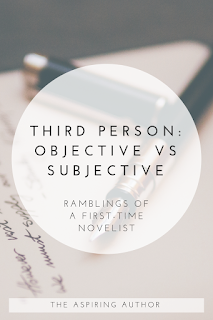
So, apparently, there are two main categories to the third person point of view: objective and subjective. Today we'll be going over what each one means and the difference between the two.
Objective POV
Objective POV is when the narrator cannot tell what the characters are thinking. Emotions, thoughts, and opinions are conveyed through dialogue or body language.
This perspective is sometimes called the "fly-on-the-wall" or "camera lens" point of view. There can be a non-human narrator to make the story less biased, and only observes the visible actions of each character.
To summarize: the objective point of view consists of external action and dialogue— the reader cannot see inside the characters' heads.
Pros:
puts story at the forefront; allows the story to be more action/plot driven makes unnecessary exposition less likelyflexible Cons:
creates distance between characters and readerall information must be conveyed through dialogue/body languageSubjective POV
The third-person subjective point of view includes the thoughts, feelings, and emotions of each character. The third person, subjective POV became the most popular narrative viewpoint in the twentieth century. As opposed to the all-knowing and all-seeing third person omniscient point of view, the narrator, and, by extension, the readers, only receive information that the characters already have.
The subjective viewpoint allows the reader to see what the characters are thinking but does not give them knowledge beyond that of the characters.
Pros:
smooth transitionscloser relationship between characters and readerless cold-feelingCons:
less intimacy than first personcan get info-dumpymight reveal too much
That's all I have for you today. This is the first in a miniseries on writing in the third person, so look out for more posts like this in the future! I'm Kayleigh, extraterrestrial life form and teen authoress extraordinaire, and I'll see you next week.
Sources
https://en.wikipedia.org/wiki/Narration
https://www.scribophile.com/academy/u...
Published on October 28, 2018 09:48
October 18, 2018
Third Person: An Introduction to the Miniseries
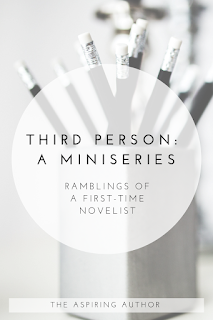
A little while ago, I thought to myself, wouldn't it be great if I wrote a blog about writing in the third person? I wanted to write about the step-by-step process of writing in the third person— specifically third person omniscient. Later, when I went to research the topic, I realized exactly how vast the subject of writing in third-person is. This blog post I was going to write became a miniseries. So, before I make the first post, here are three basic terms.
Third-person: the perspective that uses he, she, and they, but never I, us, or we. There can be one main character, but nobody refers to themselves as "I."
Third-person, multiple: third person, but with multiple characters/perspectives being taken into account.
Third-person, limited: one main character's perspective. (Harry Potter by J.K. Rowling, The Giver by Lois Lowry, 1984 by George Orwell).
We'll go over third-person omniscient and third-person alternating later on in the series.
And that's all I have for you today. The next post in this miniseries will come next week, so keep your eyes peeled!
As always, I'm Kayleigh, extraterrestrial life form and teen authoress extraordinaire.
Published on October 18, 2018 13:25
July 16, 2018
3 Common Misconceptions About Writing
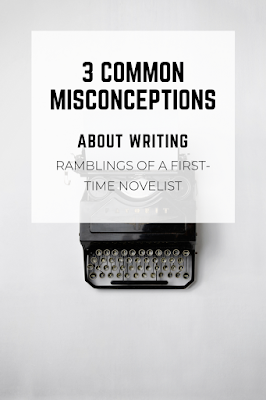 Hey everyone!
Hey everyone!This week I thought we'd talk about common writing misconceptions, so here we go!
1. Writing is Easy
So many people think this. It's mind-blowing.
In actuality, writing requires a lot of hard work and commitment.
Quality writing isn't something you can accomplish in an hour.
And yet, countless individuals believe that writing is a piece of cake. Far too many people sit down to write expecting to work miracles in a short, painless amount of time.
The truth is, even professionals will agonize over their work, so a little discomfort is normal.
2. Always Show, Never Tell
Don't get me wrong, the show-don't-tell rule applies in certain situations.
But overly descriptive paragraphs can slow down a fight scene— the last thing you want in an otherwise fast-paced situation.
Show when you want the reader to notice the details.
Tell when you want the reader to notice the action.
3. Wait For Inspiration
We all love that idea that hits us like lightning, igniting a spark in our chests. We love it when we sit down and the words pour out.
But if we wait for that idea every time we write, nothing will ever happen. Nothing will ever get done.
You can't wait for inspiration. You have to find it, to create it.
That's all I have for you this week. Please share any misconceptions you heard or might have about creative writing in the comments, and come back next week for more!
Published on July 16, 2018 13:49
July 11, 2018
Conquering Writing Doubt
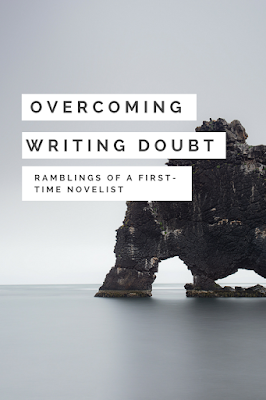 No matter what you're writing, you'll experience doubt at one point or another. Whether it's on the first page, halfway through the book, starting the second draft, during publishing, or marketing the published work, doubt will come. I'm writing this blog because I've been experiencing a lot of doubt myself recently. These are my five favorite tips on overcoming doubt.
No matter what you're writing, you'll experience doubt at one point or another. Whether it's on the first page, halfway through the book, starting the second draft, during publishing, or marketing the published work, doubt will come. I'm writing this blog because I've been experiencing a lot of doubt myself recently. These are my five favorite tips on overcoming doubt. 1. Walk AwayTake a break. Exercise, do some chores, run an errand, get something out of the way. Walking away from the computer screen can help clear your mind and improve your mood. Get your mindful minutes in for the day by doing yoga or meditating.
2. Don't Give UpEasier said than done, I know. But if you give up now, your novel will never be finished. You might think that your book is awful. That you should find something else to do, or crawl under a rock and hide for a few years. When people say they like your writing, it's hard to tell if they mean it. Maybe you're rereading and feel stupid. But something about your idea made you want to tell people about it. That's got to be worth something, right? If you're rewriting, keep in mind that the first, second, and even the third drafts are supposed to be bad. These first few drafts are just the basic structure for the final piece. Don't worry about the quality too much the first time.
3. Recharge Your Creative JuicesI mentioned taking breaks earlier. This part is about taking a literal break. Put your novel on pause for the weekend. Watch a feel-good movie, read a book or two, or start another story. By the time you get back to work, you should be able to work with a fresh point of view. Maybe you'll have some new ideas on how to tackle your latest problem.
4. Recognize Negative ThoughtsEvery time you think you won't make it as an author, recognize what's happening. Recognize the negative thought as what it is: opposition. Being critical of yourself is okay. One might even say it's essential. But it isn't your job to hate on yourself. If someone offers constructive criticism, the best thing to do is accept it. The advice I've been given is simple: remove the emotion. Whenever someone critiques you, whether you asked for it or not, remove the emotion. Ask yourself: Do they have a point? What can I do to heed their advice? Am I overreacting? Will I regret this response later? At the end of the day, they want to help. Especially if you aren't published yet.
5. Don't ProcrastinateI know what I said about a weekend off. Taking a break for the sake of your book, for the sake of your mental health, is essential. Procrastinating is not. I understand how difficult it can be to write when you don't believe in yourself. But putting off the problem will only make it harder to solve. The important thing to remember here is to push yourself, just not too hard.
That's all for today! Feel free to comment on your favorite methods of conquering self-doubt, ask me about today's topic, or suggest a blog post for next week.
Works Citedhttps://litreactor.com/columns/dealin...
Published on July 11, 2018 18:28
Fantasy Worldbuilding
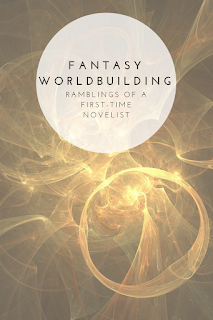 Hi, everyone! Last week, in lieu of a blog, I posted a poll on Facebook on what I should write about this week. The two options were my favorite writing resources and fantasy worldbuilding. You chose worldbuilding, so here we go!
Hi, everyone! Last week, in lieu of a blog, I posted a poll on Facebook on what I should write about this week. The two options were my favorite writing resources and fantasy worldbuilding. You chose worldbuilding, so here we go!Think About the Time
You've probably heard this before, but not every single fantasy story has to be set in medieval Europe. There are so many captivating things that happened in the past, and that's excluding the present and the future.
Disney did a great job of this in their classic movies. While Snow White was estimated to take place from the 1500's to the 1550's, a very generic medieval setting, Cinderella took place from the 1850's to the 1880's, the Princess and the Frog took place in the 1920's, and Aladdin is estimated to have taken place around the time of the Achaemenid Empire (the Persian Empire). I could go on.
Setting your story in present-day could be utterly fascinating, and this doesn't just apply to the urban fantasy genre. Your story could take place in a totally different universe and yet include modern-day technology. There are so many ways you can run with this. "Write what you know" becomes much easier when you're writing modern concepts.
And the future? Even cooler. Meshing magic with technology brings limitless opportunities. Cyberpunk cities with mages in the streets, dystopian governments with futuristic weapons along with dark enchantments, dragons from space, anything.
Don't just set your story in sixteenth-century England. The past, the present, and the future have a lot to offer in the genre of fantasy.
Find the Location
If you're basing your fantasy world off an existing civilization, do your research. Take aspects of the culture(s) and run with them. Decide how the location influences your culture, base the mythology and language off this. Don't pull a Star Wars and make every planet have one characteristic. Although I'm personally a member of the Star Wars fandom, looking at this from a realistic standpoint, Tatooine should probably have more than just a desert. And even if it does, not every planet should be like this.
Ancient Egypt, for example, had an interesting reverence for water, due to their location in the desert.
Create Societies
Chances are, your entire universe isn't just one country. Decide the population of each civilization and how it influences the culture.
Make a history for your country. Civil wars, economic depressions, mythologies, dynasties, empires that existed in the past. Make it interesting, engaging.
Create opposing views, political arguments. Don't make it seem as though everything your religious and political leaders do is perfect, and don't make them completely evil. There will be people in support of their decisions, and there will be people against them.
Take Aesthetics Into Account
Admittedly, this might come across as superficial. But it's important. Every decade has an aesthetic, every country has an aesthetic. Your ancient Greek commoners won't be practicing the ways of the samurai, nor will members of the Han Dynasty be sporting capes, tunics, and togas.
Keep in mind what technology was/is used in your location, and what is or isn't considered attractive.
Now for some worldbuilding questions!
Technical
What are the laws of physics?
How does the geography affect the culture?
How does magic meet technology?
How do magical creatures fit in?
Are there any sentient species? How many cultures do they have?
What biomes do they have? (PLEASE PLEASE PLEASE include multiple)
Religion
Answers questions about life
Is there a god/higher power? How many?
How does this religion believe the universe was created?
Is there a place to gather to worship?
What symbols are associated with this religion?
Politics
What are the political beliefs?
What is the political structure?
How is propaganda used?
How are the political figures viewed?
What are the tiers of the government?
Resources
What are the natural resources?
Where does the water come from?
What is the food supply?
Which areas are agricultural? Which areas are industrial?
Which foods are delicacies, and which are traditionally eaten?
Where are the agricultural resources, and where are the mineral resources?
Which areas, if any, have been depleted over time? How has this issue been dealt with?
Even if you don't include ninety percent of what you planned in your manuscript, worldbuilding is still beneficial. If no planning goes into your fantasy world, it shows. Try to keep your best, most relevant ideas, and discard the ones that do nothing or don't fit in.
Published on July 11, 2018 17:16
Three Things That Make Me Pick Up A Book
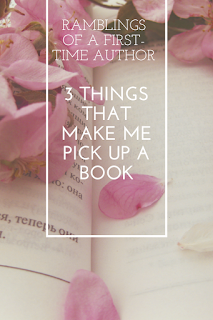 Quick Disclaimer: most of the covers I posted are just aesthetically pleasing to me. Some I have read, some I haven't. I can't guarantee how good they are.
Quick Disclaimer: most of the covers I posted are just aesthetically pleasing to me. Some I have read, some I haven't. I can't guarantee how good they are.Hi again!
For week two of my blog, I thought I’d share
the top _ things that make me pick up a book!
1. Cover
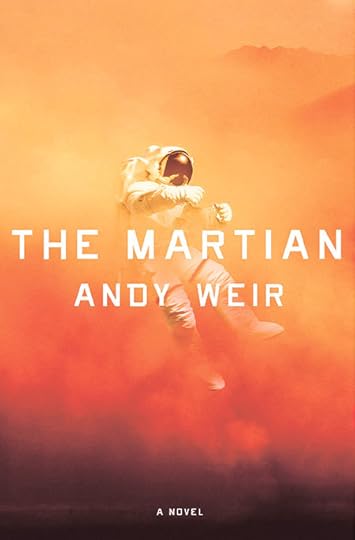 People say you shouldn’t judge a book by its cover. In a perfect world, maybe nobody would. However, the entire reason this saying exists is that people do judge books by their covers, myself included. In past experiences, books with cheap, poorly designed covers were not well-written. In fact, they were boring, hard to follow, and often downright awful.
People say you shouldn’t judge a book by its cover. In a perfect world, maybe nobody would. However, the entire reason this saying exists is that people do judge books by their covers, myself included. In past experiences, books with cheap, poorly designed covers were not well-written. In fact, they were boring, hard to follow, and often downright awful.Depending on the genre, different covers might be more or less appealing. Fantasy covers might have more details, for example, while dystopian might look better minimalist, while realistic fiction could use silhouettes, and chick lit has brighter palettes. But no matter the genre, a few things are of absolute importance.
Font: It should be large and eye-catching. Certain fonts look better than others, some fonts look cheap. If you remember anything from this, it’s that no matter how much you spend, you do not want to look cheap. Contrast cursive fonts with regular ones, thin fonts with bolds, complex with simple, vintage with modern, serifs with sans serifs. Avoid fonts that are too similar. Make some parts smaller than others. Use fonts from the same family, and when you’re done, ask yourself, does it look cheap?
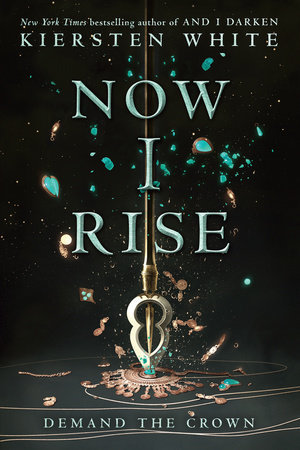 Imagery: I always love minimalist covers, with simple backgrounds and one, eye-catching image in the center. It draws the gaze right to the focus-point of the cover and gives it a clean, uncluttered look. Another thing I love is a quote on the cover, something to pull the reader in. For the novel I’m currently working on, this quote is “Nothing in Life is Free.”
Imagery: I always love minimalist covers, with simple backgrounds and one, eye-catching image in the center. It draws the gaze right to the focus-point of the cover and gives it a clean, uncluttered look. Another thing I love is a quote on the cover, something to pull the reader in. For the novel I’m currently working on, this quote is “Nothing in Life is Free.”Blurb: This could be praise quotes from other authors or a quick summary designed as a hook. Whatever it is, it needs to be to-the-point and engaging. Not everyone has a lot of attention devoted to your book, and you have to convince them to buy it in the span of a few sentences.
2. Reviews
Whether it’s on Goodreads or Amazon, I always look at the reviews. There’s not much you can do about the reviews other than produce quality material. If there are mostly good reviews, I will buy the book. So will, I’m assuming, most of your potential readers. If there’s a negative review here and there, or even if half the reviews are bad, I’ll still take my chances.
Don’t worry if you have bad revi
ews or even mediocre ones. Not everyone will love your book, and there’s not much you can do about it.
3. First Five Pages
I’ll either read the first few pages or open to a random part in the middle. If I don’t like the prose or find the five pages I read disengaging, I’ll put the book down. If I find an error in spelling or grammar, forget it.
The book needs to have a clean and polished look. The beginning has to draw me in. If nothing is happening for thirty pages at a time, broken up by a page and a half of action, that is bad.
Make your book interesting, add action, create realistic dialogue. Edit.
That’s all I have for you today.
Published on July 11, 2018 17:06
June 21, 2018
Three Cliches That Should Not Drive Your Plot
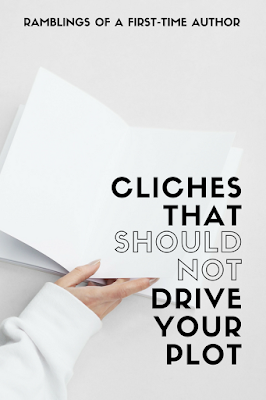 Humans invented the written word five thousand, two hundred eighteen years ago, but stories have existed since long before then. The Brothers Grimm alone recorded more than two hundred folk tales in their lifetimes. With so many thousands of accounts, writing something unique is next to impossible. However, some plot devices have been used to the point of being hackneyed. And some minor plot devices have been treated as significant. Here, in no particular order, are the top three cliches that should not drive your plot. 1. Mountain Out of a MolehillYou’re reaching the end of your chapter or book, and you need a cliffhanger. You need a way to guarantee your reader’s continued interest. So you throw in some conflict between two of your characters. Sometimes they’re friends, but usually, they’re lovers. This conflict is generally over something small. The main character forgets to mention something trivial. The love interest finds out. There's screaming, and drama, and suddenly neither of them are talking to the other. Some— most— would call this fight petty. Instead, it's blown way out of proportion, because that's a compelling hook, right?The reader thinks this entire relationship is in jeopardy, right?Wrong. Avoid this if at all possible. It is not a plot twist. It is infuriating.2. The LieIn this one, the main character is competing for something. They're in a difficult situation: they must either kill another character or die.The main character eventually does the unthinkable and takes a human life. They are allowed to progress at the cost of some of their innocence. Later on, they develop a close relationship with a different character. This character is often the friend, family, or love interest of the one the main character had to kill.The protagonist should tell this character what happened, they know this, but they don't. Because… plot convenience?They lie through their teeth, toil over it for a few chapters, and then the other character finds out. Drama ensues.The main character now has an archenemy, someone who used to be their friend or romantic partner. How utterly exciting, especially since the reader was probably screaming internally at the hero throughout the novel.This method is cheap and makes the story seem poorly planned. It makes the reader feel cheated and takes away from their overall experience.3. The Villain… He’s My Father!Writers have used this over and over. Star Wars, Mortal Instruments, and many, many more. It's just sort of tired at this point. I read this twist and roll my eyes. As with many worn-out cliches, this one makes it seem like the author wrote themselves into a corner and needed a way out.
Humans invented the written word five thousand, two hundred eighteen years ago, but stories have existed since long before then. The Brothers Grimm alone recorded more than two hundred folk tales in their lifetimes. With so many thousands of accounts, writing something unique is next to impossible. However, some plot devices have been used to the point of being hackneyed. And some minor plot devices have been treated as significant. Here, in no particular order, are the top three cliches that should not drive your plot. 1. Mountain Out of a MolehillYou’re reaching the end of your chapter or book, and you need a cliffhanger. You need a way to guarantee your reader’s continued interest. So you throw in some conflict between two of your characters. Sometimes they’re friends, but usually, they’re lovers. This conflict is generally over something small. The main character forgets to mention something trivial. The love interest finds out. There's screaming, and drama, and suddenly neither of them are talking to the other. Some— most— would call this fight petty. Instead, it's blown way out of proportion, because that's a compelling hook, right?The reader thinks this entire relationship is in jeopardy, right?Wrong. Avoid this if at all possible. It is not a plot twist. It is infuriating.2. The LieIn this one, the main character is competing for something. They're in a difficult situation: they must either kill another character or die.The main character eventually does the unthinkable and takes a human life. They are allowed to progress at the cost of some of their innocence. Later on, they develop a close relationship with a different character. This character is often the friend, family, or love interest of the one the main character had to kill.The protagonist should tell this character what happened, they know this, but they don't. Because… plot convenience?They lie through their teeth, toil over it for a few chapters, and then the other character finds out. Drama ensues.The main character now has an archenemy, someone who used to be their friend or romantic partner. How utterly exciting, especially since the reader was probably screaming internally at the hero throughout the novel.This method is cheap and makes the story seem poorly planned. It makes the reader feel cheated and takes away from their overall experience.3. The Villain… He’s My Father!Writers have used this over and over. Star Wars, Mortal Instruments, and many, many more. It's just sort of tired at this point. I read this twist and roll my eyes. As with many worn-out cliches, this one makes it seem like the author wrote themselves into a corner and needed a way out. So that's all I have for you today. You can pull any of these cliches off, but you have to do them very well. I'll see you next week!
Published on June 21, 2018 15:10



